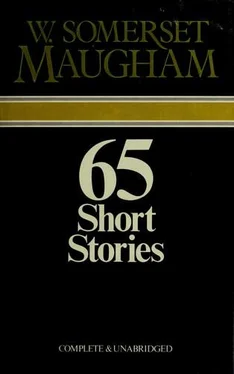Somerset Maugham - Sixty-Five Short Stories
Здесь есть возможность читать онлайн «Somerset Maugham - Sixty-Five Short Stories» весь текст электронной книги совершенно бесплатно (целиком полную версию без сокращений). В некоторых случаях можно слушать аудио, скачать через торрент в формате fb2 и присутствует краткое содержание. Жанр: Фантастика и фэнтези, на русском языке. Описание произведения, (предисловие) а так же отзывы посетителей доступны на портале библиотеки ЛибКат.
- Название:Sixty-Five Short Stories
- Автор:
- Жанр:
- Год:неизвестен
- ISBN:нет данных
- Рейтинг книги:4.5 / 5. Голосов: 2
-
Избранное:Добавить в избранное
- Отзывы:
-
Ваша оценка:
- 100
- 1
- 2
- 3
- 4
- 5
Sixty-Five Short Stories: краткое содержание, описание и аннотация
Предлагаем к чтению аннотацию, описание, краткое содержание или предисловие (зависит от того, что написал сам автор книги «Sixty-Five Short Stories»). Если вы не нашли необходимую информацию о книге — напишите в комментариях, мы постараемся отыскать её.
Sixty-Five Short Stories — читать онлайн бесплатно полную книгу (весь текст) целиком
Ниже представлен текст книги, разбитый по страницам. Система сохранения места последней прочитанной страницы, позволяет с удобством читать онлайн бесплатно книгу «Sixty-Five Short Stories», без необходимости каждый раз заново искать на чём Вы остановились. Поставьте закладку, и сможете в любой момент перейти на страницу, на которой закончили чтение.
Интервал:
Закладка:
'Is he often drunk?'
'Dead drunk, three or four days a week. It's the island done it, and Ethel.'
'Who's Ethel?'
'Ethel's his wife. Married a half-caste. Old Brevald's daughter. Took her away from here. Only thing to do. But she couldn't stand it, and now they're back again. He'll hang himself one of these days, if he don't drink himself to death. Good chap. Nasty when he's drunk.'
Chaplin belched loudly.
'I'll go and put my head under the shower. I oughtn't to have had that last cocktail. It's always the last one that does you in.'
He looked uncertainly at the staircase as he made up his mind to go to the cubby hole in which was the shower, and then with unnatural seriousness got up.
'Pay you to cultivate Lawson,' he said. 'A well-read chap. You'd be surprised when he's sober. Clever too. Worth talking to.'
Chaplin had told me the whole story in these few speeches.
When I came in towards evening from a ride along the seashore Lawson was again in the hotel. He was heavily sunk in one of the cane chairs in the lounge and he looked at me with glassy eyes. It was plain that he had been drinking all the afternoon. He was torpid, and the look on his face was sullen and vindictive. His glance rested on me for a moment, but I could see that he did not recognize me. Two or three other men were sitting there, shaking dice, and they took no notice of him. His condition was evidently too usual to attract attention. I sat down and began to play.
'You're a damned sociable lot,' said Lawson suddenly.
He got out of his chair and waddled with bent knees towards the door. I do not know whether the spectacle was more ridiculous than revolting. When he had gone one of the men sniggered.
'Lawson's fairly soused today,' he said.
'If I couldn't carry my liquor better than that,' said another, 'I'd climb on the waggon and stay there.'
Who would have thought that this wretched object was in his way a romantic figure or that his life had in it those elements of pity and terror which the theorist tells us are necessary to achieve the effect of tragedy?
I did not see him again for two or three days.
I was sitting one evening on the first floor of the hotel on a veranda that overlooked the street when Lawson came up and sank into a chair beside me. He was quite sober. He made a casual remark and then, when I had replied somewhat indifferently, added with a laugh which had in it an apologetic tone:
'I was devilish soused the other day.'
I did not answer. There was really nothing to say. I pulled away at my pipe in the vain hope of keeping the mosquitoes away, and looked at the natives going home from their work. They walked with long steps, slowly, with care and dignity, and the soft patter of their naked feet was strange to hear. Their dark hair, curling or straight, was often white with lime, and then they had a look of extraordinary distinction. They were tall and finely built. Then a gang of Solomon Islanders, indentured labourers, passed by, singing; they were shorter and slighter than the Samoans, coal-black, with great heads of fuzzy hair dyed red. Now and then a white man drove past in his buggy or rode into the hotel yard. In the lagoon two or three schooners reflected their grace in the tranquil water.
'I don't know what there is to do in a place like this except to get soused,' said Lawson at last.
'Don't you like Samoa?' I asked casually, for something to say.
'It's pretty, isn't it?'
The word he chose seemed so inadequate to describe the unimaginable beauty of the island that I smiled, and smiling I turned to look at him. I was startled by the expression in those fine sombre eyes of his, an expression of intolerable anguish; they betrayed a tragic depth of emotion of which I should never have thought him capable. But the expression passed away and he smiled. His smile was simple and a little naive. It changed his face so that I wavered in my first feeling of aversion from him.
'I was all over the place when I first came out,' he said.
He was silent for a moment.
'I went away for good about three years ago, but I came back.' He hesitated. 'My wife wanted to come back. She was born here, you know.'
'Oh yes.'
He was silent again, and then hazarded a remark about Robert Louis Stevenson. He asked me if I had been up to Vailima. For some reason he was making an effort to be agreeable to me. He began to talk of Stevenson's books, and presently the conversation drifted to London.
'I suppose Covent Garden's still going strong,' he said. 'I think I miss the opera as much as anything here. Have you seen Tristan and Isolde?'
He asked me the question as though the answer was really important to him, and when I said, a little casually I daresay, that I had, he seemed pleased. He began to speak of Wagner, not as a musician, but as the plain man who received from him an emotional satisfaction that he could not analyse.
'I suppose Bayreuth was the place to go really,' he said. 'I never had the money, worse luck. But of course one might do worse than Covent Garden, all the lights and the women dressed up to the nines, and the music. The first act of the WalkГјre's all right, isn't it? And the end of Tristan. Golly!'
His eyes were flashing now and his face was lit up so that he hardly seemed the same man. There was a flush on his sallow, thin cheeks, and I forgot that his voice was harsh and unpleasant. There was even a certain charm about him.
'By George, I'd like to be in London tonight. Do you know the Pall Mall restaurant? I used to go there a lot. Piccadilly Circus with the shops all lit up, and the crowd. I think it's stunning to stand there and watch the buses and taxis streaming along as though they'd never stop. And I like the Strand too. What are those lines about God and Charing Cross?'
I was taken aback.
'Thompson's, d'you mean?' I asked.
I quoted them:
'But when so sad, thou canst not sadder,
Cry, and upon thy so sore loss
Shall shine the traffic of Jacob's ladder
Pitched between Heaven and Charing Cross.'
He gave a faint sigh.
'I've read The Hound of Heaven. It's a bit of all right.'
'It's generally thought so,' I murmured.
'You don't meet anybody here who's read anything. They think it's swank.'
There was a wistful look on his face, and I thought I divined the feeling that made him come to me. I was a link with the world he regretted and a life that he would know no more. Because not so very long before I had been in the London which he loved, he looked upon me with awe and envy. He had not spoken for five minutes perhaps when he broke out with words that startled me by their intensity.
'I'm fed up,' he said. 'I'm fed up.'
'Then why don't you clear out?' I asked.
His face grew sullen.
'My lungs are a bit dicky. I couldn't stand an English winter now.' At that moment another man joined us on the veranda and Lawson sank into a moody silence.
'It's about time for a dram,' said the newcomer. 'Who'll have a drop of Scotch with me? Lawson?'
Lawson seemed to arise from a distant world. He got up.
'Let's go down to the bar,' he said.
When he left me I remained with a more kindly feeling towards him than I should have expected. He puzzled and interested me. And a few days later I met his wife. I knew they had been married for five or six years, and I was surprised to see that she was still extremely young. When he married her she could not have been more than sixteen. She was adorably pretty. She was no darker than a Spaniard, small and very beautifully made, with tiny hands and feet, and a slight, lithe figure. Her features were lovely; but I think what struck me most was the delicacy of her appearance; the half-castes as a rule have a certain coarseness, they seem a little roughly formed, but she had an exquisite daintiness which took your breath away. There was something extremely civilized about her, so that it surprised you to see her in those surroundings, and you thought of those famous beauties who had set all the world talking at the Court of the Emperor Napoleon III. Though she wore but a muslin frock and a straw hat she wore them with an elegance that suggested the woman of fashion. She must have been ravishing when Lawson first saw her.
Читать дальшеИнтервал:
Закладка:
Похожие книги на «Sixty-Five Short Stories»
Представляем Вашему вниманию похожие книги на «Sixty-Five Short Stories» списком для выбора. Мы отобрали схожую по названию и смыслу литературу в надежде предоставить читателям больше вариантов отыскать новые, интересные, ещё непрочитанные произведения.
Обсуждение, отзывы о книге «Sixty-Five Short Stories» и просто собственные мнения читателей. Оставьте ваши комментарии, напишите, что Вы думаете о произведении, его смысле или главных героях. Укажите что конкретно понравилось, а что нет, и почему Вы так считаете.









